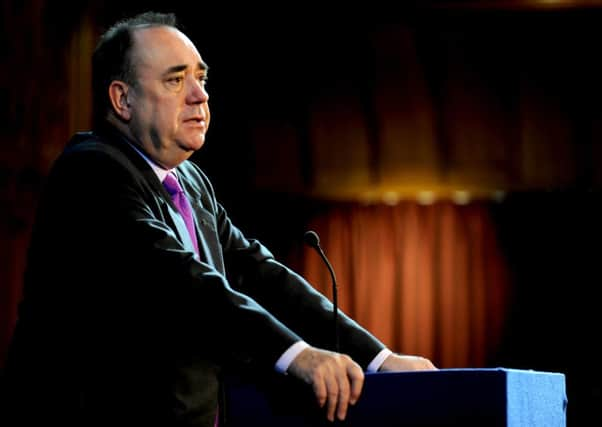Leaders: EU poses more questions than answers


The main attraction, from Mr Salmond’s perspective, ought to be that a pro-EU vote alongside a Yes vote would significantly strengthen the Scottish Government’s hand in negotiating EU membership. The EU, which has a moral duty to respect democratically-expressed national wishes, could hardly reject Scottish membership or impose conditions, such as use of the euro or participation in the Schengen free travel regime, if these were the terms on which Scots had said Yes to independence and to Scottish EU membership.
A secondary attraction is that it could dramatically change the importance which the question of EU membership has assumed in the EU debate. The uncertainties surrounding the question of whether the EU would welcome an independent Scotland or not have become a major factor likely to determine whether people vote Yes or No.
Advertisement
Hide AdAdvertisement
Hide AdBut by putting an EU membership question on the ballot paper, Mr Salmond could defuse it. He could argue that Scots will determine whether their country is in or out of the EU, as the EU has no record of rejecting any democratically-expressed wish to join, a position with which his unionist opponents are unlikely to disagree.
Moreover, it could be argued that such a two-question referendum has historical legitimacy. Such a plebiscite established the devolved Scottish Parliament and its right to set taxes. Indeed, one of Tony Blair’s reasons for including a second question on tax- raising powers in that ballot was to kill off any tartan tax-type opposition to the passage of the devolution bill through Westminster. But then Mr Salmond could also claim the same democratic backing from a Yes vote because these are the terms set out in the independence white paper. It’s not quite the same black-and-white endorsement admittedly, but it still amounts to democratic approval.
And there are lots of other issues – retention of the monarchy, membership of Nato, use of sterling and the Bank of England – to which the same argument could be applied and, if it was, would result in voters facing more an examination than a ballot paper.
Of course, if there is a Yes vote in September and EU membership turns out to be problematic, Mr Salmond could always strengthen his own hand by holding an EU referendum a few months later. And if there is a No vote, Scotland would participate, if David Cameron is re-elected in 2015, in the EU in/out referendum he plans for 2017. And if there is a Scottish “in” vote and a rest of UK “out” vote then, that would be a pretty pickle, wouldn’t it?
Speyside bid is not in the right spirit
SOME have argued that the crystal tumbling waters of the Spey and its tributaries taste better than champagne. But should Speyside be to the whisky industries that depend on its water what the Champagne region of France is to champagne-making?
Local bigwigs think it is a great idea. Such an accolade, they reckon, will boost tourism, bringing the growing host of worldwide whisky-lovers, not just to sample their way round Morayshire’s distilleries, but also filling hotels and visiting other attractions.
Nice try folks, but it is not really on. Champagne is a legally-protected name, which prevents other sparkling wine producers, not just in other countries, but also in regions of France outside the designated champagne-producing area, from calling what they produce champagne.
Any suggestion that Speyside’s distillers are attempting to gain the same distinction for their locality would rightly be greeted with horror by all other whisky distillers and derided by the many whisky connoisseurs, who have their own particular favourite from other parts of Scotland.
Advertisement
Hide AdAdvertisement
Hide AdSpeyside can certainly argue that its spirit is different and has its own unique qualities – that is all part of the marketing game. But to seek some special status implying it is a cut above everywhere else, implying that true malt whisky is only to be found in Moray, that’s not on.
There is nothing to prevent the distillers, local tourism bosses and others mounting a joint campaign to promote the area and its many outstanding products. If they are as good as they are, then there is no reason why the name Speyside cannot generate a cachet of its own. But that should not be at the expense of others.